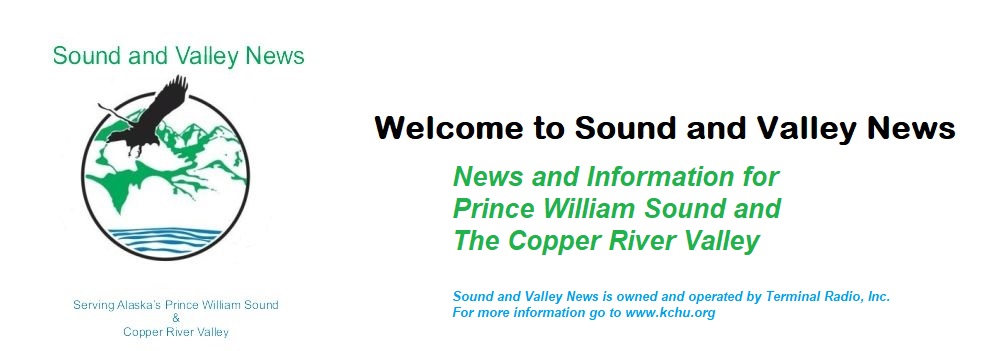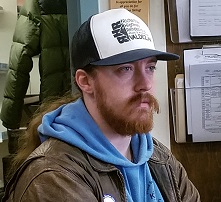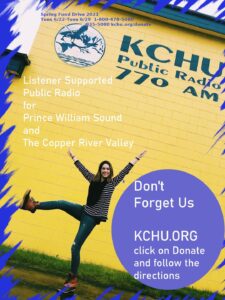The end of the comment period for oil and gas exploration near Katalla and Controller Bay in the Gulf of Alaska is rapidly approaching, and the project has many opponents. Their shared message is consistent: the land and the wildlife is more valuable than the resourses that may lie beneath. KCHU’s James Devens has this report: (Click on the link below his picture to listen to the KCHU audio. Transcript below)
On August 2nd, 2019 The Alaska Department of Natural Resources Division of Oil and Gas released a document entitled “Gulf of Alaska Oil and Gas Exploration License Preliminary Written Finding of Director” in regards to Katalla and Controller Bay in the Gulf of Alaska. The proposed development area overlaps largely with the Area E Fishery, which is among the largest fisheries in the world. The development proposal blankets an area that includes Bering River, Katalla Bay, Controller Bay, Strawberry Harbor, Redwood Bay, and Softuk Lagoon, and is directly adjacent to the Copper River Delta.
Cordova District Fisherman United, stated in a letter, they “have opposed oil and gas exploration and development along the northern Gulf of Alaska for over 30 years.” But, they aren’t alone in their opposition of the proposal. Carol Hoover, with the Eyak Preservation Council says the opposition is essentially unanimous.
Carol Hoover: “A resolution from the Town of Cordova has come out flatly against it.Cordova District Fisherman United: Against it. Copper River Watershed Project: Against it. Eyak Preservation Council: Against it. Copper River Delta Sound Waterkeeper Alliance: Against it. Mayor of Cordova, City Council: Against it. There’s not… Ain’t no one for it.”
The primary concern among the vocal opposition is the chance for environmental disaster. The area is remote, and ecologically and culturally important to many. Area E Fisherman Bill Black, who has worked in the region since 1971 said that the Exxon Valdez catastrophe should have been a wake-up call for what oil can do to fish stocks, and essential fisheries.
Bill Black: “There weren’t any for a couple of years after the spill. If there is a leak, If there is spills, if there is a rupture of any pipelines that flows into the ocean, there’s no way we can do anything about it in that area. It’s not like Prince William Sound: There’s an ocean swell.”
Though the fear for an ecological disaster is the driving concern for many, the apprehension for development of any type is that changes to the area could mean changes for those that rely on and revere the region. Eyak Native Dune Lankard described the area as “…of high cultural and historical significance to the Eyak people and to the Tlingit and Chugach tribes who inhabited the region.”
|
|
The Eyak Preservation Council has concerns that the cultural aspects and materials found in that district, and the fishing done there, could be irrevocably changed even if everything goes exactly to plan.
Carol Hoover: “Even if there aren’t any mistakes, they’re going to have to build infrastructure, they’re going to have to build drilling rigs, they’re going to have to have ships going back and forth in an area when fisherman are going to be fishing. It’s illogical, and there’s too much damage that could happen.”
Cordova Mayor Clay Koplin says his concern is precautionary, and that though he is not entirely against development of new oil wells, he is not satisfied with the state’s current standard of safety and regulations, and therefore can’t support this project.
Clay Koplin: “This is critical habitat, and given the history of oil spills in Prince William Sound, and the proximity to some of the richest fishing waters in Alaska, at a bare minimum, exploration there would have to deploy the very highest standards of care, and I think the community is just concerned that adequate standards don’t currently exist.”
According to Petroleumnews.com, the developing entity, known as Cassandra Energy Corp. first purchased a lease for the Katalla Area Oil Field in April of 2001. Why development has never progressed until now is unclear, and Cassandra Energy could not be reached for comment.
Public Comment Period on the proposed development ends on November 4th at 5:00PM. For KCHU in Valdez, I’m James Devens.



Pingback: Gulf of Alaska Oil & Gas Exploration